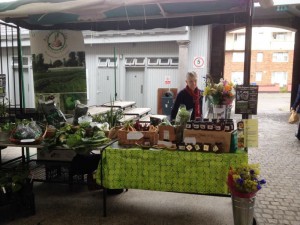Level 6 Advanced Certificate in Horticulture
Those who have completed the Level 5 Certificate in Horticulture progress to this full time course which runs from September to September. Learners apply the skills gained at Level 5 to take responsibility and control of the entire production process relating to an Organic Horticultural Enterprise. This involves sowing, planting, maintaining, harvesting, processing and selling organic vegetables, fruit, herbs, flowers and trees.
The modules provided to complete this Certificate include:

Organic Crop Production (6N3621):
This Module will equip the learner with the knowledge and skills to manage an Organic Product Enterprise it also goes into the detail of how to grow specific fruit and vegetable crops organically. It specifically recommends the best techniques and varieties for growing in Irish conditions.
Market Gardening (6N3614):
This module covers the production of a range of vegetable, fruits, herbs and flower crops. Learners will be able to: Explain current regulations regarding protection of waters against pollution by nitrates from agricultural sources including cross compliance requirements pertaining to fruit and vegetable production. Describe quality assurance schemes and codes of practice relevant to the fresh produce supply chain
Sustainable Horticulture (6N3626):
This QQI Level 6 Award provides a strong base for developing professional skills in market gardening, nursery stock production, landscape design and sustainable resource management.
Tree & Shrub Management (6N3624):
This module includes developing practical skills for coppice woodland management, learning about trees and development, and establishing and managing new woodlands.
Supervisory Skills ( 6N2104):
The purpose of this award is to equip the learner with the knowledge, skill and competence to work independently in a supervisory capacity in a range of specific organisations and vocational contexts.
Communications (6N1950):
The purpose of this award is to equip the learner with the relevant knowledge, skill and competence to communicate verbally and non-verbally in standard everyday tasks and in work-related tasks, operating independently while under general direction. To facilitate the learner to understand the importance of effective communication skills in human interaction.
- To assist the learner to acquire excellent communications skills to ensure maximum participation in personal and vocational life.
- To enable the learner to become aware of the importance and the impacts of modern communications and information technology on both personal and vocational life.
- To assist the learner to develop the academic and vocational language, literacy and numeracy skills related to Communications through the medium of the indicative content.
- To enable the learner to exercise substantial personal autonomy and responsibility.
Ecology and the Envoronemnt (6N3645)
The purpose of this award is to equip the learner with the knowledge, skill and competence to assist in management of the natural environment.
Learners will be able to:
Review policy framework for environmental and biodiversity protection in Ireland including International Union for Conservation of Nature (IUCN) designations for species, site designations,codes of good practice for fertiliser use, pesticides, tree establishment and felling, landscape and heritage protection, European Union (EU) and national legislation including water protection legislation, water framework directive, nitrate directive, wildlife act and habitats directive
Appraise the role of statutory and voluntary organisations in environmental protection
Examine techniques available for the management of sites to promote biodiversity
Evaluate factors influencing population dynamics and community composition including relevant tools and techniques for monitoring populations and communities
Examine habitat restoration techniques including consideration of impact of everyday work practices on the natural environment
Report on a range of environmental features such as: vegetation survey, Braun-Blanquet scale, quadrats and linear survey elements, hedgerow assessment including structure, species composition, connectivity, diversity and associated features, water quality assessment to include invertebrate biodiversity, Q values and chemical indicators such as pH or P, epiflora of walls, colonisation of waste ground, succession on disturbed ground
Apply practical techniques for the recognition of semi natural habitats and habitat features in the field to include blanket bogs, woodland types, coastal habitats to include fixed dunes, dune slack, salt march and semi natural grassland 8 Identify invasive species of plant and pest.
I want to find out more
Register you interest using this form and we’ll send you more information.
Or there is more information on the main course page.